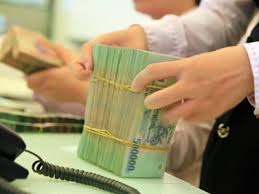Eagle eyes on rate moves
 In fact, banks’ mobilising rates slid sharply in the past month.
In fact, banks’ mobilising rates slid sharply in the past month.
One month ago, most banks still offered 12 per cent, per year for long-term deposits of at least 12 months, now the rate is mostly pegged at 10.5 per cent, per year which is viewed at diverse banks like Vietcombank, VietinBank, Eximbank, Military Bank (MB) and Vietnam International Bank (VIB).
Besides, over a month ago huge sums (VND10 billion or $476,000) were particularly appeared to banks with mobilising rates reaching 13-14 per cent, per year.
Now, banks’ interest in such deposits is cooling.
“Currently most banks asked their staff to offer a 0.3-0.5 bonus rate per year more to bigger deposits compared to common ones and this needs approval from bank top leaders,” said a credit staff member at a Hanoi bank.
That credit staff also said the mobilising rate lost from 0.2-0.3 per cent per year in the past week and current downward trend would linger on.
VIB acting director Le Quang Trung attributed softer interest rates to inflation calming down and banks striving to expand credit.
State Bank figures show that banking sector credit growth contracted 0.86 per cent in the year to February 21, 2013. That was why in the past months banks have en masse rolled out a series of preferential credit packages to garner customers.
It also admitted current lending rates remained at fairly high levels beyond the tolerance of many firms.
Accordingly, lending rates to priority areas fetch 9-12 per cent, per year, to other production and business areas from 11-15 per cent per year (short-term) and 14.6-17.5 per cent, per year (medium-and long term).
Vietnam Centre for Economic and Policy Research director Nguyen Duc Thanh said two reasons existed to explain why lending rate remained high albeit banks possessed rich capital sources and mobilising rates were going down.
First, banks have to put bigger amounts into loan loss provisioning due to high bad debts.
Second, banks can buy government bonds which fetch from 8-9 per cent yield, per year which help reduce the need to relax lending rate to attract borrowers.
“Banks’ contracted credit forced the government to increase spending on public investment through issuing government bonds to warm up demand. The measure, however, averts lending rate from further going down. Besides, inflation, though being contained, would possibly come back if we lack vigilance,” said Thanh.
What the stars mean:
★ Poor ★ ★ Promising ★★★ Good ★★★★ Very good ★★★★★ Exceptional
Related Contents
Latest News
More News
- Cashless payments hit 28 times GDP in 2025 (February 04, 2026 | 18:09)
- SSIAM and DBJ launch Japan Vietnam Capital Fund (February 04, 2026 | 15:57)
- Banks target stronger profits, credit growth in 2026 (February 04, 2026 | 15:43)
- Vietnam on path to investment-grade rating (February 03, 2026 | 13:07)
- Consumer finance sector posts sharp profit growth (February 03, 2026 | 13:05)
- Insurance market building the next chapter of protection (February 02, 2026 | 11:16)
- NAB Innovation Centre underscores Vietnam’s appeal for tech investment (January 30, 2026 | 11:16)
- Vietnam strengthens public debt management with World Bank and IMF (January 30, 2026 | 11:00)
- Corporate bond market poised for stronger growth cycle (January 28, 2026 | 17:13)
- Vietnam's IPO market on recovery trajectory (January 28, 2026 | 17:04)

 Tag:
Tag:




















 Mobile Version
Mobile Version